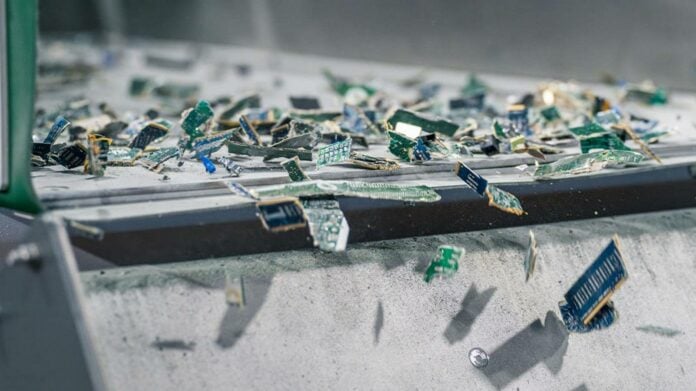UK Royal Mint, one of the oldest manufacturing organisations in the world with 1,100 years of history, has officially opened its precious metal recovery factory. In it, tons of electronic waste will be recycled to extract gold and other metals to be used on new products and items.
The UK coinmaker’s multi-million-pound metals recovery plant spans 35 acres in South Wales. It takes entire PCBs (Printed Circuit Boards), mobile phones, plus laptops to recycle them and recover precious metals. These include gold, silver, palladium, copper, iron, aluminium, tantalum, and steel. This reduces the amount of waste shipped aboard just to be buried in landfills, or worse, while creating new employment positions.
To do so, the Royal Mint uses the world’s first patented chemistry from Canadian company Excir, which is capable of extracting gold in liquid form after only minutes, and most importantly at ambient temperatures. The process is said to generate up to 450kg of gold from 4,000 Tons of E-waste as it can extract 99% of gold from PCBs.
This is then transformed into high purity gold powder which gets mixed with other elements to create the final carat/grade wanted. In the end, this precious metal is used in making a range of jewellery plus other products. That said, the Royal Mint didn’t mention making coins with these materials, probably due to the costs associated with recycling.
Regardless, this opens the way for a more sustainable solution to the growing environmental problem, while maximising the use of materials. Understandable as the UK is the second-largest generator of e-waste per capita in the world, expected to take the top spot in 2024. Worldwide, some 50 million Tons of e-waste are generated each year, expected to reach 82 million tons by 2030 and 120 million tons by 2050.
Currently, only 17% of electronic waste is formally recycled, meaning the longer we wait, the harder it will become to deal with. Not to forget that these components can include toxic elements that leach into the environment causing irreversible health effects.
Factories like this will become valuable as recovery technologies advance. Most metals can be reused to make other products, even PCBs’ glass fibres can be repurposed to strengthen concrete. So, it’s just a matter of profitability and efficiency.

